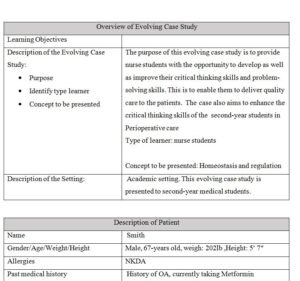Requirements
Description of the Assignment
This assignment requires the student to develop an evolving case study that would be useful in either the clinical or classroom setting. It is not written for a simulation learning activity. The evolving case study must focus on a concept assigned from Giddens (2017) required textbook during Weeks 2, 3, and 4. In addition, the student must identify Socratic questions related to the pathophysiology, pharmacology, and health assessment used in the evolving case study. The study demonstrates the following.
- Initial presentation (i.e., Stage 1) regarding the health status of the patient
- Progress to Stage 2 with the occurrence of event that requires the identification of the appropriate response from learners
- Ends with Stage 3 that is based upon the action identified by learners
The development of Socratic questions useful for debriefing following completion of the evolving case study are required.
Criteria for Content
Overview of the assignment
The evolving case study starts with background information that provides an overview; description of the patient; and the report provided to the participants using the format of situation, background, assessment, and recommendation (SBAR). Progressing over time with a fictional patient’s health status changing, this evolving case study presents the situation in three stages. Stage 1 is the initial stage where the patient’s healthcare situation is presented, followed by a trigger, which represents a health challenge or worsening of health. Participants identify the appropriate interventions to maintain a stable health status as well as recognize via assessment the deterioration in the fictional patient’s health. Stage 2 continues the presentation of the patient with progressive decline in health status requiring the identification of appropriate actions by participants. A trigger for Stage 3 will be identified based on the stabilization of the fictional patient. An outcome of the evolving case study is suggested as part of Stage 3. Preparation for the debriefing of participants is considered by the identification of Socratic questions.
Required content for the assignment
Part 1: Overview of evolving case study
- Description of the evolving case study
- Identify the purpose
- Identify the type of learner that case study is developed for
- Identify the concept to be demonstrated by the fictional patient
- Description of the setting
Part 2: Description of fictional patient by identifying each of the following elements
- Name
- Gender/age/weight/height
- Allergies
- Past medical history
- History of present illness
- Social history
- Primary medical diagnosis
- Surgeries and/or procedures with dates
Part 3: Develop the report that learners receive prior to the start of the evolving case study using SBAR
- Time of report
- Identify person providing the report
- Identify each of the following for SBAR
- Situation
- Background
- Assessment
- Recommendation
Part 4: Stage 1: Start of the healthcare situation with required elements
- Evolving case study information to be presented to the learner
- One action that a learner SHOULD identify that is APPROPRIATE for the situation
- Socratic question for each area to ask learner at end of Stage 1
- Pathophysiology
- Physical assessment
- Pharmacology
- Trigger for Stage 2
Part 5: Stage 2: Deterioration in fictional patient’s health status with required elements
- Evolving case study information to be presented to the learner
- One action that a learner SHOULD identify that is APPROPRIATE for the situation
- Socratic question for each area to ask learner at end of Stage 2
- Pathophysiology
- Physical assessment
- Pharmacology
- Trigger for Stage 3
Part 6: Stage 3: Stabilization of fictional patient with required elements
- Evolving case study information to be presented to the learner
- One action that a learner SHOULD identify that is APPROPRIATE for the situation
- Socratic question for each area to ask learner at end of Stage 3
- Pathophysiology
- Physical assessment
- Pharmacology
- Expected ending for case study if learner’s actions are APPROPRIATE for the situation
Part 7: Debriefing
- Socratic Question 1 (focusing on overall Stage 1)
- Socratic Question 2 (focusing on overall Stage 2)
- Socratic Question 3 (focusing on overall Stage 3)
- Socratic Question 4 (focusing on the overall case study)
Solution:

.To access the solution click the icon below to purchase at $15